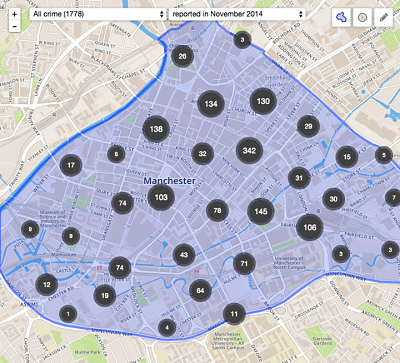Moving house? Check the crime rate around your new house for free (warning it’s pretty scary what goes on) and whilst it only updates on a month-by-month basis it’s quite interesting to see what goes on and can give you a good sign of how good an area is before you go further with the purchase.
Other tips to consider before you buy a house:
- Go to the house at different times of the day and park up nearby, with the windows down and just sit there for 20-30 minutes (e.g. after school, on a Friday/Saturday late night, at rush hour & 6-9pm mid-week) – This will allow you to see/hear any problems like local parents parking in your street every day after school, the house being alongside a cut-through for drunken people at 4am each Friday, does it become gridlock at rushhour or is the street turning into a parking nightmare once everyone is home from work.
- Go and knock the door of the neighbour’s house to say hello and see if they’ve got any concerns or had any problems – This is also a good excuse to be nosey and see who your future neighbours might be
- Go for a walk nearby and simply explain to people you’re thinking of moving to a house nearby, is the area OK / is there anything you should know about?
- Join the local Facebook groups to get a rough sense of what people are like nearby
- Go and check the local nearby facilities like pubs, shops, doctors, hospital etc
- If you’re not local find a B&B, AirBnb or hotel and stay for a few nights to get a better feel for the area
- If you have kids, read the local school Ofsted reports + consider asking parents as they walk away school
- Check your phone signal both inside and outside the property
- Consider posting letters in the doors of the houses that take your fancy, doing this might just net you a similar property with a decent saving on top.
- Check local planning site and do some Google Map Earth Views to see about any potential nearby ground that will likely be built on etc
- Check for potential flood risk
The house itself
- Have a proper inspection/survey done (unless you really are sure what you’re doing) and/or get a trusted builder to attend a viewing if work needs to be done.
- Take PLENTY of photos of all the rooms from all angles
- Run the hot water (this shows if there is a big delay in getting hot water) and check for water under the sinks etc
- Open and close some of the doors/windows
- Check the woodwork in the loft, guttering outside and roof condition (e.g. damaged tiles)
- Make sure you do visual checks of all the rooms, ceilings and floors etc for signs of mould, stains, subsidence etc
- Make sure to ask plenty of questions of the homeowner (this is a good way to find out how well they know the house and have been looking after it)
- How long has it been on the market?
- How many viewings?
- Can I see the electrical checks/reports?
- Have there been any disputes with the neighbours?
- How old is the boiler? Warranty?
- What is included in the sale?
- Any subsidence problems?
- What is the council tax band?
- Will they take it off the market if you offer a price?






























